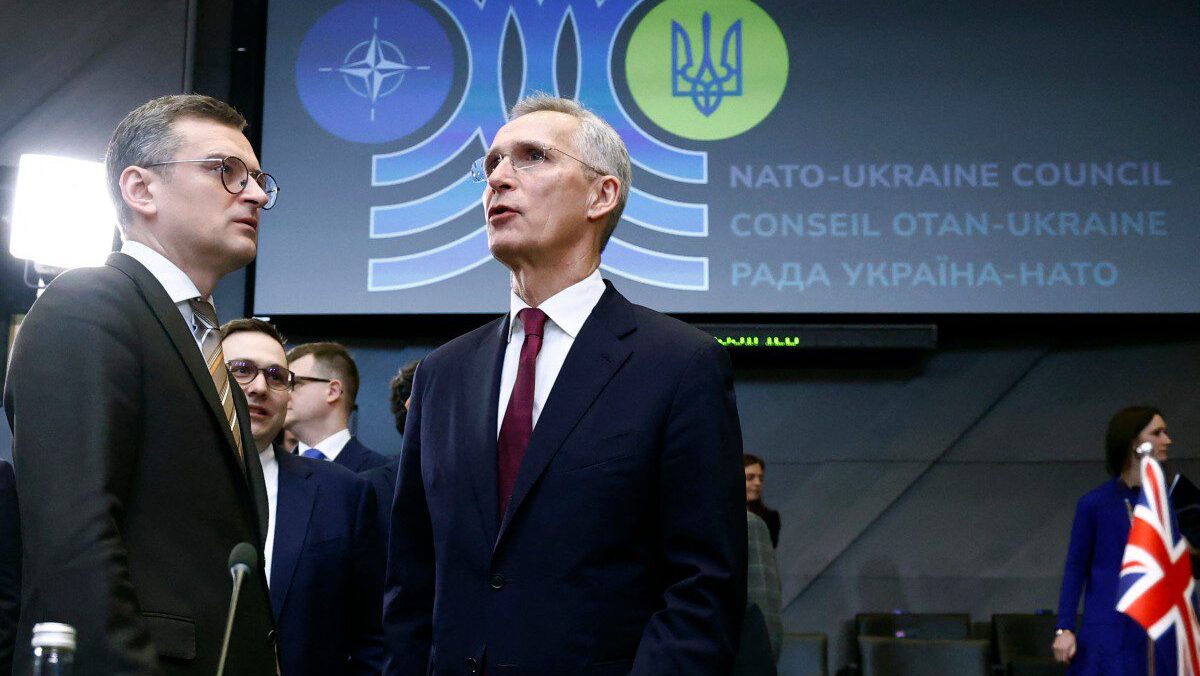
Ukraine’s Foreign Minister Dmytro Kuleba (L) and NATO Secretary General Jens Stoltenberg arrive for a meeting of the NATO-Ukraine Council in the Foreign Ministers’ session at the Alliance’s headquarters in Brussels on April 4, 2024.
Photo: KENZO TRIBOUILLARD / AFP
NATO member states are wary of backing a plan that would provide Ukraine with €100 billion in long-term military aid and increase the military alliance’s involvement in the war. Moscow has warned Western states that they are already on the brink of direct confrontation with Russia.
“We strongly believe that support to Ukraine should be less dependent on short-term, voluntary offers and more dependent on long-term NATO commitments,” NATO Secretary-General Jens Stoltenberg said on Wednesday, before the start of the alliance’s foreign ministers’ meeting in Brussels. Stoltenberg proposed creating a €100 billion five-year fund to support Ukraine, an idea that has drawn mixed responses from member states.
Hungary—which has refused to send any military aid to Ukraine—has rejected the idea outright: Foreign Minister Péter Szijjártó said such a proposal would draw the alliance “closer to this war than it has ever been before.”
Others have warned against duplicating bilateral and European Union aid efforts for Ukraine. Since Russia invaded its neighbour more than two years ago, NATO members have sent tens of billions of dollars worth of weapons to Ukraine on a bilateral basis. NATO, as an organisation, has focused on only non-lethal aid for Ukraine out of fear of provoking Russia.
However, Stoltenberg now wants NATO to play a more coordinated role in how its member states supply lethal weapons. Under the proposal, NATO would take over some coordination work from the U.S.-led coalition known as the Ukraine Defense Contact Group, an alliance of 56 countries that coordinate the ongoing donation of military aid at monthly meetings. While Stoltenberg’s plan would not see NATO directly providing weapons to Ukraine, it would mark a new phase in its involvement in the war.
Today marks 75 years since the founding of #NATO—the strongest & most successful alliance in history. Foreign Ministers met to address #Ukraine’s urgent & long-term needs; we must step up even more. We also discussed deepening cooperation with our Indo-Pacific partners. 🇦🇺🇯🇵🇳🇿🇰🇷 pic.twitter.com/VXGHnd9rjo
— Jens Stoltenberg (@jensstoltenberg) April 4, 2024
Reacting to these announcements, Kremlin spokesman Dmitry Peskov said relations between Russia and NATO “have now slipped to the level of direct confrontation.” NATO was “already involved in the conflict surrounding Ukraine (and) continues to move towards our borders and expand its military infrastructure towards our borders”, he added.
Sweden became the 32nd country to join NATO this year, a decision made by its parliament not long after Russia invaded Ukraine in 2022. Finland, a previously non-aligned nation, also decided to join the alliance for the same reasons and became a member last year.
The war between Ukraine and Russia, which entered its third year at the end of February, has reached a stalemate. Russia, which controls almost a fifth of Ukrainian territory—including the Crimean Peninsula, which it annexed in 2014—has seen some successes on the battlefield this year. In contrast, Ukraine is heavily reliant on Western military aid to have any chance of repelling future attacks. “The situation on the battlefield in Ukraine is serious. We see how Russia is pushing, and we see how they try to win this war by just waiting us out,” Stoltenberg warned.
There is a decreasing appetite in Europe for pledging more weapons to Ukraine, while further financial aid is being blocked by the U.S. Congress where the Republican majority is growing tired of funding the war. Meanwhile, some European leaders are worried that the United States’ commitment to defending European NATO members could be questioned if former Republican president Donald Trump were to return to the White House after November’s U.S. elections. Stoltenberg’s proposal for NATO to take the lead in coordinating weapons supplies is designed to guard against any potential cuts in U.S. support, were Trump to return.
Trump was criticised earlier this year for telling the United States’s allies he would not rush to defend them if they failed to “pay their bills,” i.e. spend 2% of their respective national budgets on defence—a commitment all NATO members are obliged to adhere to. While Trump’s words were deemed “dangerous,” his tough stance during his presidency (2017-21) actually contributed to the strengthening of the alliance, with 20 out of 32 member states set to reach the 2% threshold this year, compared to 2014, when only three countries met that standard.
While no instant decision or pledge of providing Ukraine with further assistance was made in Brussels this week, NATO members have agreed to “go back and look into their inventories, look into if there are any ways they can provide more [weapons] systems,” Stoltenberg said on Thursday. U.S. Secretary of State Antony Blinken said more support for Ukraine was especially important as countries like China, North Korea, and Iran were supporting Russia’s efforts to build up its defence industrial base.
More concrete decisions will likely be made at the summit of NATO leaders, which will take place in July in Washington D.C.
